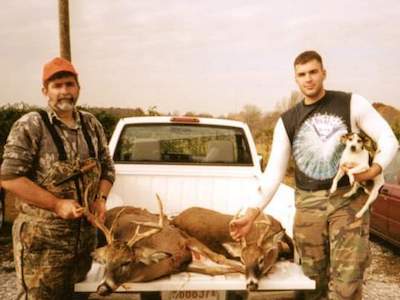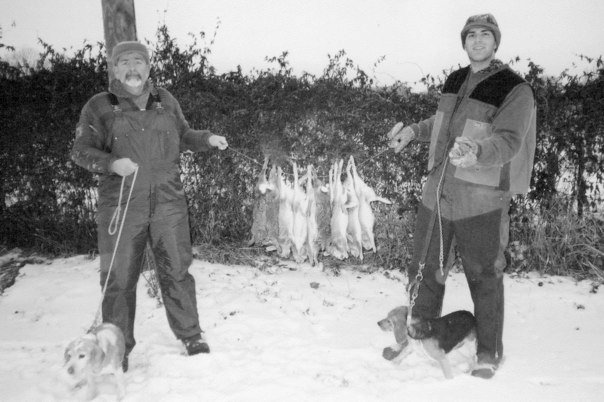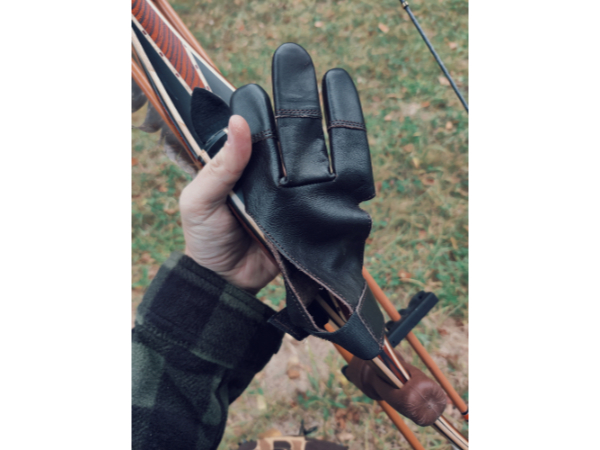I have often been asked the question, whether through direct or indirect means, “Why do you hunt?” It’s a poignant yet perplexing question to answer. I liken it to describing the color purple to someone who has never seen the color in their life. Impossible, right? Yet if someone has seen something like the Clematis ‘Jackmanii’, which grew on my front porch as a child, then the description of purple becomes a much more attainable task. For example, I can tell you that the Jacmanii is a Clematis cultivar which, when it was introduced in 1862, was the first of the modern large-flowered hybrid clematises of gardens. It is a climber with large violet-purple blooms, still among the most familiar climbers seen in gardens. The flower it produces is a violet-purple. So, for all intents and purposes, I have described the color purple to you. This of course would be through life experiences of the person I am talking with. However, if said person had not seen that flower I would need to take him/her to see it. Either by walking out my back door in the warmer months of the year or pulling up a picture on my phone. You cannot describe a color to someone without them experiencing it for themselves or showing them an example of it. The same is true of hunting. I can’t explain it to you if you have zero life experiences with it, or have never been shown an example of hunting. Even then it’s hard to put into words. My intent over the next few reading moments is to do just that. I can’t take you hunting or even show you examples, but what I plan on doing with words is encouraging you to think without the eyes of someone who has experienced a fantasy world of animals that talk and have your best interest at heart. These animals have instincts that allow them to survive and flourish in a wild, wild, world.
Ecosystems
When I was very young I learned about ecosystems. I learned about the delicate balance between producers, consumers, and herbivores, omnivores, and carnivores. I learned about the importance of predators and prey. We used to rush home from Sunday evening church service to watch the PBS program “Nature”. I LOVED that show along with “Marty Stouffer’s Wild America”. I remember always catching myself rooting for the prey to escape the predators. I was saddened by the way a rabbit was taken by a hawk, a deer by a coyote, an elk by a bear, or a zebra by a lion. I remember discussing the sadness with my father. I’ll never forget the way he explained it to me.
 He asked me, “Do you see those cute baby hawks, coyote pups, bear cubs, and lion cubs?” Nodding my head yes he continued asking, “Do you know what a carnivore is?” I remember answering, “Yes, it’s an animal that eats only meat, except for the bear, he is an omnivore.” My dad just smiled and said, “Very true.” He continued on to explain that if those mommy and daddy “predators” don’t hunt and aren’t successful killing their prey not only do the adults die but the pups and cubs die too. Well that sent me in a spiral of philosophical thinking that I dare say most 8/9 year olds never even consider. So for the survival of those on the “cuteness” scale, like the aforementioned, if predators are to survive they must hunt to feed their young “cute” animals. It was an epiphany.
He asked me, “Do you see those cute baby hawks, coyote pups, bear cubs, and lion cubs?” Nodding my head yes he continued asking, “Do you know what a carnivore is?” I remember answering, “Yes, it’s an animal that eats only meat, except for the bear, he is an omnivore.” My dad just smiled and said, “Very true.” He continued on to explain that if those mommy and daddy “predators” don’t hunt and aren’t successful killing their prey not only do the adults die but the pups and cubs die too. Well that sent me in a spiral of philosophical thinking that I dare say most 8/9 year olds never even consider. So for the survival of those on the “cuteness” scale, like the aforementioned, if predators are to survive they must hunt to feed their young “cute” animals. It was an epiphany.
I later learned in school about the intricate balance in an ecosystem. Prey actually depend on predators to hunt and thin the numbers down so that the ecosystem can handle the correct amount of prey. It’s a fairly simple concept. Most prey eat vegetation. If prey numbers are to high then they eat the vegetation until nothing is left or not enough is left to maintain those numbers. If the vegetation is scarce or gone completely the prey die a slow painful death of malnutrition and/or starvation.
Gene Wensel and Peter Hathaway Capstick wrote when talking about man’s role in the ecosystem that man has eyes in the front of the head. The correlation is, predators in the wild have the same characteristic. Our bodies also need protein and have the ability to eat meat allowing us to sustain our good health. Which brings us to our logical conclusion. We are predators. It is instinctual within us to want to hunt.
Tools of the Trade
I grew up in Indiana. I was always tall for my age. I also had a stature that some might have considered intimidating. In most other areas people would think football but in Indiana it was basketball. I had all the tools to be a basketball player and I chose to use them to play the sport.
A teacher once gave us a paper that had a photocopy of Julius Erving’s hand. It was a life size photo. His hand was absolutely enormous. I remember thinking that this had to be a joke and could not possibly be correct. He definitely had the tools to play basketball, that being just one of them. Predators hunt and kill because of a basic need. The need to survive. They are given the equipment to hunt prey and be successful. We are predators and have been given the tools to hunt. Like all tools we can choose to use those tools or not. We chose whether or not to let those tools lay dormant or use them. If we chose to use them we also satisfy that basic need to hunt.
“Maybe stalking the woods is as vital to the human condition as playing music or putting words to paper. Maybe hunting has as much of a claim on our civilized selves as anything else. After all, the earliest forms of representational art reflect hunters and prey. While the arts were making us spiritually viable, hunting did the heavy lifting of not only keeping us alive, but inspiring us. To abhor hunting is to hate the place from which you came, which is akin to hating yourself in some distant, abstract way.” -Steven Rinella
Hunter Gatherer
Years and years of us hunting and gathering from the dawn of our existence was for survival. A good indicator of a successful family was one that survived by putting food on the table. I do this kind of thing today. I will show my wife my harvested game. She couldn’t care less, however, I am completing a process that has gone on for an untold number of years. Being proud of my harvest and sharing it’s bounty with my loved ones. It’s a time of celebration and respect. Celebration for the kill that was made through skill and the food that it will now provide. Along with the respect for the animal that gave it’s life so I could feed my family. Hidden amongst all that, however, is the simple truth that in so doing I bring balance to the ecosystem to help keep it in check.
 Stewards
Stewards
One of my favorite Bible verses:
“And God blessed them: and God said unto them, Be fruitful, and multiply, and replenish the earth, and subdue it; and have dominion over the fish of the sea, and over the birds of the heavens, and over every living thing that moveth upon the earth.”– Genesis 1:28
The concept of replenishing and dominion over it has always made me think of the power we as humans have been given on this earth. Unfortunately I feel we have done a very poor job as stewards but all I can do to make change is to do my best on speaking about conservation and taking the steps on my own to replenish the land. It reminds me of the story of the man who set out to change the world. He lived his whole life and changed nothing. He realized in his old age that if he would’ve focused on making a change through his family he would have changed them. His family would’ve helped change the community they live in. The community would have helped change the state and the state the nation and the nation the world. This whole idea of the butterfly effect. Small changes can create huge waves of change. It’s so very important for us not only to replenish the earth but our soul. So as a hunter I see the importance of conservation and balance.
Circle of Life
I remember watching the Lion King for the first time and hearing the discussion about the circle of life from the father Mufasa and the son Simba. Mufasa by the way means king in Manazoto and Simba is Swahili for lion. The concept of things die so others may live.
It starts for us at the most basic form of life, single celled organisms, all the way through to plant life and the most complex life, animals.
Russell M. Nelson once said “We were born to die and we die to live. As seedlings of God, we barely blossom on earth; we fully flower in heaven.”
The idea we “were born to die” is not very comforting but we can’t deny the fact that life and death are so closely related. Life takes while death gives. We have to put it in perspective. Where do we as mankind fit into this circle? Our place has always been one in which we are the predator. Is that true today? Yes, of course it is. Most people do their hunting at the meat department in a grocery store or fast food restaurant like McDonald’s. They are so far removed from the death that occurs for the meat to make it to their mouth that they become distant to the process. It makes people unaware of the sacrifice that was made to feed them. Is this part of the problem hunters have at explaining why the love of the hunt is not a bloody, gory mess? In my opinion, absolutely! How do we get past this point? I don’t have an answer, but to get others to at least think of the connections to food and death is a start.
Camaraderie
The first time I went hunting I was with my dad. We went rabbit hunting. I held a toy gun that shot a spongy bullet out with a spring loaded firing mechanism. It couldn’t do anything any harm but I thought I was a hunter with it in tow. I don’t remember the hunt at all, I just remember how I felt spending time with my dad. I felt so grown up. Part of hunting is the bond that we share with those that we love and care about. Passing on knowledge of the hunt and experiencing successful hunts. Some of my most memorable hunts have not been “successful” but we’re pure joy in other aspects.
“From morning till night I was on foot, in cool, bracing air, now moving silently through the vast, melancholy pine forests, now treading the brink of high, rocky precipices, always amid the most grand and beautiful scenery; and always after as noble and lordly game as is to be found in the Western world.”— Theodore Roosevelt The Wilderness Hunter
Years ago I went deer hunting in early November. I hunted two different stands on the same property. I never pulled my bow back but I saw over 100 deer, 50 or more were bucks. Being able to watch it unfold in front of me was a spectacular experience. Recently I went turkey hunting with my middle child. The hunt was unsuccessful. We saw absolutely nothing. I was upset and I had apologized to him about how bad it was, when my 8 year old son reminded me what it is all about, “Don’t worry Daddy, I had fun just spending time with you.”
It’s those moments that make us as hunters realize that it’s part of the reason we hunt. The experience with one another that allows us the time to slow down and soak in our surroundings. To enjoy creation in all its splendor.
“There are some who can live without wild things and some who cannot.” – Aldo Leopold
This is not an exhaustive list of reasons explaining why man hunts by any stretch of the imagination. I also know that someone reading this will be able to pick apart all my arguments and tell me how wrong I am about this or that. I am aware of the philosophical differences. I doubt any of my words will change minds. It most likely will just reaffirm personal beliefs. However, if I can get just one person who didn’t understand hunting to think with a different perspective and then possibly change their mind on hunting that’s all the difference I can hope for. Changing the world one person at a time.







A thoughtful read, I enjoyed the idea of the camaraderie aspect, thanks for the article!
What a thoughtful and well written piece. You have done a great job of sheading a bit on wisdom and the making of memories involving the whole hunting experience. Well done sir!
I will have to remember this when someone asks me why I hunt. Well done.
A very well written piece. So often the “why” is undersold or poorly communicated by those in the hunting community to people who have far different perspectives on hunting and conservation. I will be sure to share this with others.
Great work!
Great article summarizing admirable reasons to hunt!
Beautiful read. This made my Sunday morning!